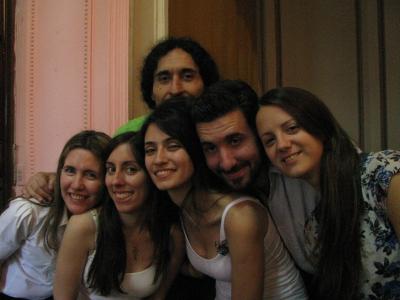To play or not to play, to sleep, to dream, to step into your role, to change clothes (please!)

It happened last Sunday evening. Everyone seemed to arrive at once: the actores, the spectators, the girl in charge of the lights, the coach, the directress of the Faro Company. Nora went about putting the last touches on her "Leg of Lamb." Kiran Sharbis was in a tet-a-tet with his acting companion, Verónica. Jessica, the social worker was dressed splendly, Marcia, the poor Italian immigrant mother began to move about with her "other" body; Cecily, looking as smart as could be in her business suit, asked the coach if her red carpet would fit in her role as narrator in "The Lover," and Gwen, Natalie and Gideon calmly went about putting the finishing touches on their costumes. "The Theatre Game" was about to begin.
How would a housewife, deeply in love with her husband and six months pregnant, react should her husband gruffly annouce his plans to divorce her? You'd have to see the Hopkins theatre workshop students version of "A Lamb to Slaughter." Perhaps one of the most telling moments was that blow, when she crashed the icy leg of lamb against the dense forest of hair covering her husband's head.
Most critics do not consider Tennessee Williams' short play, "The Dark Room" to be a comedy. But the encounter between the representative of the state and the poor mother of Italian extraction certainly contains elements of irony. A pregnant 16 year old daughter pregnant, alone in a dark room, only seeing her ex-boyfriend (in turn married to another woman) certainly carries the seed for irony. Perhaps the play also serves to take a deeper look at how the welfare system works in the United States.
What happens the day after? That is, the day after the marriage? The lives of the bride and groom have suddenly changed. What are their joys, what are their fears, what are their freak-outs? Actually, that's only half the story. "The wedding," a creation based on a simple text, pits an actress convinced of her professionalism against an actor who seems not to take his role seriously (or perhaps is more serious about impressing his acting mate than playing his role). What would the great theoreticians of acting technique say about the dilemma?
And then: "The Lover," a readapted version of Harold Pinter's play. Theatre is a game, they say. To act is to play. But what about life? Is it not also a game? Richard is tired of the game he has been playing with his wife. He wants out. They have each become the "lover" or the "mistress." How can such a situation be resolved? The workshop students invented another character: a maid who secretely falls in love with the husband. So you have the typical (typical?) trio. That doesn't necessarily mean the end is "typical."
If you want to see these skits you would do well to meander down to the Faro theatre December 15th at 8pm. The address? 2151 Moreno street 2-B. The performance is free, although a hat appears after the clapping is over. If you speak English and like to play you might also like to participate in the games and improvisations previous to the performance!
By the way: if you have managed to read this far you might be interested in a summer activity being planned at the Faro theatre: an acting out songs workshop January 12 and 26 from 4 to 8pm. Songs often are stories, with characters, conflicts. Why not look for the characters, invent the plot and act out the idea with your fellow workshop companions?
Contact: hopalfred@gmail.com
0 comentarios